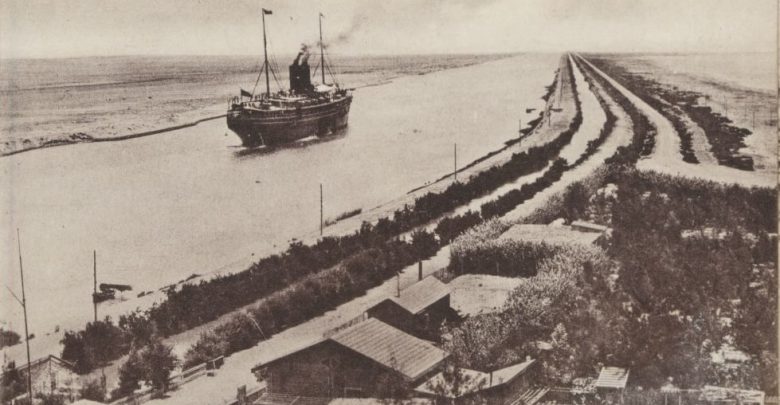
The Suez Canal is known to be one of the most important pathways in the world among others. It’s also considered to be the shortest pathway between the East and the West because of its uncommon strategic and geographic location. It finally opened its doors in 1869 for trading purposes after 10 years of construction. The canal is currently used by European maritime trade companies to exchange goods and products with India, China and the rest of Southeast Asia. It’s dubbed as the international navigational canal that serves as a link between the Mediterranean Sea at Port Said and the red Sea. It’s particularly important to Egypt as its navigation extends from morning until evening. Also, its main goal was to cut the travel time from Europe to Asia without having to traverse through Africa.
Fun fact: The Suez was originally dug out of the dessert by hand!
Now that we’ve briefly explained the definition of the Suez Canal, we’ll delve into its importance in WWII. The battle for North Africa was a huge struggle for control of the Suez Canal and access to oil from the Middle East and raw materials from Asia. Oil was a growing commodity as modern armies needed weapons and tools. The tribulations to control North Africa began as early as October 1935, when Italy invaded Ethiopia from its colony Italian Somaliland. This shift caused Egypt to become extremely wary of Italy’s imperialistic aspirations. In effect, the British were blessed with large forces within their zone thanks to the Egyptians. Later on, France and Britain decided to mutually divide the responsibility for maintaining naval control of the Mediterranean.
After, France and Britain decided to divide the responsibility for controlling the naval aspect of the Mediterranean, Italy decided to maintain a neutral standpoint. With the invasion of Germany by the French in June 1940, Benito Mussolini could not resist the chance to grab his share of the deal. Six days after the British evacuation at Dunkirk, France, Italy shifted full circle and decided to declare war on Britain and France. This then sparked the war between Britain and Italy in the Mediterranean.
In the end, who benefited from the Suez Canal the most? It was Britain. With their journey from London to Bombay which was lessened by a whopping 5,150 miles! Since the British took control of Egypt, the Suez Canal was under their rule.
For nearly 150 years, the Suez Canal has connected the Mediterranean to the Red Sea with a rich history that was shaped with the onset of multiple wars. Not every single war was expounded on in this article, only the important ones. In the end, the loss of a spectacular strategic setback for Germany sparked an effective economy-of-force campaign. Finally, the Suez Canal ignited a failed British, French and even Israeli invasion. By the year 1956, Arab nationalist Gamal Abdel Nasser nationalized the Suez Canal, making it accessible for the public to use at their disposal for trade. The Suez Canal and Nasser were then dubbed symbols of national pride.


